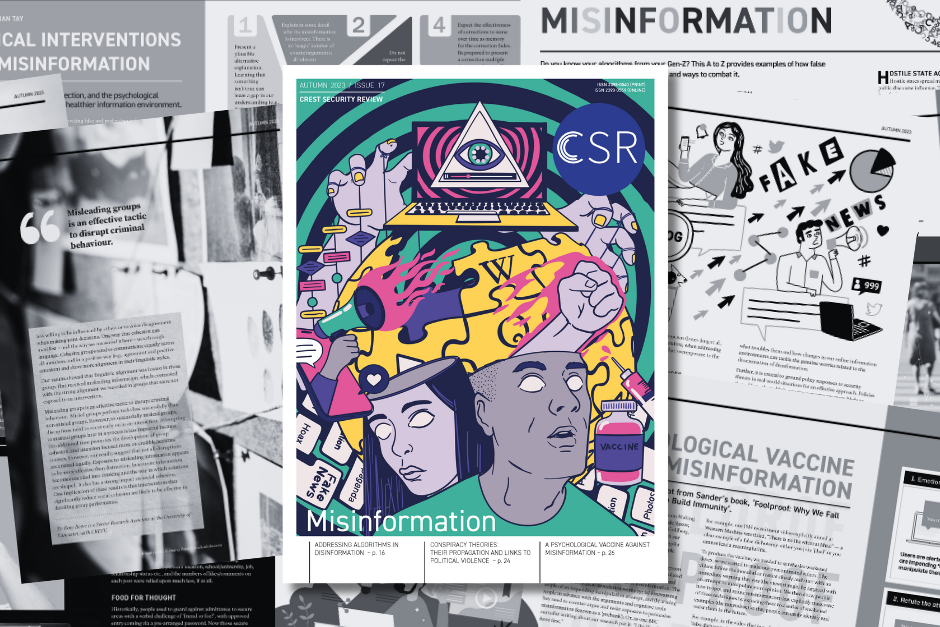Using fuzzy set qualitative comparative analysis to study differences in conspiracy believers
7 December 2023
The plethora of security ramifications of conspiracy beliefs range from public health endangerment to violent attacks on democratic institutions. In this blog, Isabella Orpen, a Research Assistant at the Security, Crime, and Intelligence Innovation Institute, explains how understanding diverse types of conspiracy believers is crucial to better understanding and mitigating the potential risks.
Scholars repeatedly note the radicalising power of conspiracy ideologies. Storming of the Capitol and eruptions of extremism during the coronavirus pandemic illustrate the security implications of strongly held conspiracy beliefs. Even more casually held conspiracy beliefs, such as mistrust of vaccines and information surrounding coronavirus, can severely impact following government guidance and therefore public health. The coronavirus pandemic and the global rise of populist conspiracy theories show that the appetite toward conspiracy ideation is more commonplace than previously thought.
Conspiracy beliefs often run counter to official narratives and centre around a group of malicious conspirators and their hidden involvement in seemingly unrelated events. Conspiracy theory belief is a term often used in research to refer to both conspiracy mentality (i.e. the propensity toward conspiracy beliefs) and belief in specific conspiracy theories (e.g. anti-vaccination myths). This understanding of conspiracy beliefs can encompass a wide array of beliefs.
This definition makes no judgement on the veracity or morality of such beliefs. There is ongoing debate in academic literature and the media regarding whether conspiracy beliefs are solely harmful and divisive for society or if critical examination of official narratives can have benefits. This debate is wrongly based on the assumption that conspiracy beliefs are uniform (homogenous) and that all conspiracy believers are alike. More recent research has called for greater understanding of the diversity (heterogeneity) of conspiracy beliefs and believers.
One way we can examine the heterogeneity of conspiracy beliefs and believers is through Fuzzy set Qualitative Comparative Analysis (fsQCA). This method combines the contextual richness of qualitative case-based analysis and the rigour of quantitative analysis. Adding a degree of fuzziness to the variables’ membership means a further level of nuance can be achieved.
Conspiracies are Fuzzy by Nature
Conspiracy scholars disagree over whether conspiracy beliefs are a product of an extreme minority or a general human tendency. Recognition of different levels of conspiracy belief can help to reconcile these two disparate schools of thought. The survey data collected by the research team at Security, Crime, and Intelligence Innovation Institute shows that almost three-quarters of British respondents exhibit some level of conspiracy mentality and that a third agree with anti-vaccination myths and do not trust the official mortality rates reported for coronavirus. Within this group of ‘believers’ we see a difference in the strength of beliefs, with some showing a ‘strong’ belief across all indicators and others showing mixed or casual belief across the indicators. FsQCA is well-suited to address the nuanced nature of conspiracy beliefs, which often exist in a grey area between fact and fiction. It offers a framework where complex concepts can be measured on a continuum rather than relying on binary distinctions. By incorporating thresholds, fsQCA helps determine the strength of beliefs and identifies the point at which they transition from weak to strong.

Complex Combinations of Conditions
Research has identified psychological traits (e.g. paranoia) and social beliefs (e.g. patriotism) as key ‘conditions’ in conspiracy beliefs. However, these conditions are almost exclusively identified through regression-based net effect models. Attempts to isolate each condition’s unique impact on conspiracy beliefs fail to account for their interconnectedness.
FsQCA allows for conditions to have varied effects depending on their configuration with other conditions. This nuance is hindered by methods that only consider the net effects of factors on conspiracy beliefs, as they aim to isolate and identify the impact of individual conditions instead of embracing their contextual complexities.
Diversity in Pathways to Strong Belief
Heterogeneity in conspiracy beliefs goes beyond the intensity of belief. The origins of these beliefs are also crucial to consider. FsQCA allows multiple ‘pathways’ (configurations of conditions) to lead to the same outcome. Therefore, heterogeneity among conspiracy believers can be understood in terms of both the strength of their belief and the different pathways that led them there. For those with a strong conspiracy mentality and strong coronavirus conspiracy beliefs, multiple configurations can result in the same outcome. This underlines the value of using configurational methods (such as fsQCA), as there is not a single pathway to strong conspiracy beliefs.
Examining the Absence of Conspiracy Beliefs
FsQCA considers both the presence and absence of an outcome, such as strong conspiracy beliefs. Unlike other techniques, fsQCA recognises that the presence of certain conditions associated with the outcome does not guarantee that their absence will lead to a negated outcome.
This understanding is pivotal in addressing the risks associated with conspiracy beliefs, as research often focuses on identifying risk factors that can be used to prevent harmful behaviours. FsQCA highlights that practitioners should identify not only risk factors but also protective factors, while explaining why the two may not perfectly align with each other.
This blog has shown the adoption of new analytical methods to examine the complexity and diversity of conspiracy beliefs and believers. FsQCA presents an interesting methodological solution to the intricacies of conspiracy beliefs. Broadening our understanding of different types of conspiracy beliefs can help to understand at what point they pose a security risk and how this can be mitigated.
This blog originally appeared in the 17th edition of the CREST Security Review ‘Misinformation’.